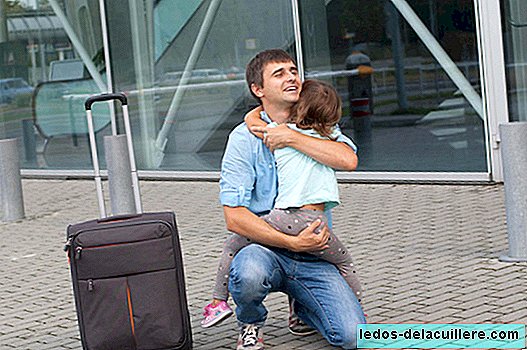Yesterday we read this news in which the Supreme Court had settled jurisprudence with a sentence that states that in divorce cases, the distance between parents Not only does it make it difficult, but it makes the joint custody of children in common unfeasible, "given the distortion" and "alterations in the child's life regime" that this can cause.
And in this particular case the child traveled every three weeks from San Sebastián, where he lived with his father, to Cádiz where he lived with his mother traveling a thousand kilometers each time and attending two different schools.
Shared custody and distance. When is it not possible?
"It is not appropriate to subject the child to two different schools, two different health care services and trips of one thousand kilometers every three weeks", includes the High Court resolution that has defended the interest of the child "which requires a stable frame of reference, away from a nomadic existence".
With regard to the distance between the domiciles of the parents, and before the existing legal vacuum, there have already been several times in which the Supreme Court has had to pronounce."The distance between addresses must be taken into account so as not to attribute custody and shared custody, only when it may harm the interest of the child to reside parents in distant municipalities, if for example it affects their sleep periods due to the displacements they must make to go to school. "- Collect the web Legal News
The Supreme Court ruled on this point for the first time in a ruling issued in March 2016, in which it denied the joint custody requested by a father from Cádiz, due to the distance between his home and that of the mother of the child in Granada , about 300 km away.
"Really distance not only makes it difficult to adopt the shared custody system with weekly stays, given the distortion that this can cause and the alterations in the regime of life of the smallest child when compulsory schooling is close, all reasons that motivate the denial of the shared custody system "

In this other sentence issued in December 2016, joint custody was denied because the parents resided in two different Madrid towns, separated by 50 km. Mateo Bueno Lawyer's blog picked it up like this:
"Thus, although several of the requirements that would normally give rise to the establishment of the joint custody regime concur, there is a circumstance that discourages it because it implies an alteration of the child's normal life, especially when he reaches school age, since both parents reside in populations that are about fifty kilometers apart and this would mean that in alternate weeks the child would have to travel that considerable distance to travel to school. "
However, in this other case we read on the website of the Spanish Association of Family Lawyers, the Provincial Court of Madrid dismissed an appeal filed by a woman who did not want joint custody, alleging among other things that the distance of 25 km between his home and that of the child's father made it impossible.
"Nor is it a reason to reject the proposal on joint custody and custody the fact that the defendant currently maintains his residence in Madrid, and since it is not an obstacle that prevents the viability of custody and shared custody from declaring the fact of that the appellant resides in an area of Madrid, not far from the town of Valdemoro, so that the distance between one and another residence, the latter of the minors located in Valdemoro, is not an obstacle to give rise to the proposed subsidiary claim for the appellant ".
It seems clear, therefore, that 25 kilometers away is no reason to deny shared custody, at least in this last example, but as we read in this news, Jurisprudence in general denies shared custody in the case of residence of parents in different cities.
Common sense and welfare of the child, the keys that should always prevail

There is no doubt that in cases of friendly divorce where parents resolve their differences in a civilized manner, and there is love and dedication to children on both sides, shared custody is best for the child as it allows him to enjoy both parents equally.
The Supreme Court itself in 2011 ordered that "does not allow us to conclude that it is an exceptional measure, but rather, should be considered the most normal, because it allows the right that children have to relate to both parents to be effective, even in crisis situations, whenever this is possible and as long as it is ".
Therefore, the courts and tribunals have been applying this regime almost systematically although there are many lawyers who consider that should be applied with more moderation and common sense, since in most cases the child is forced to constantly change his address, with the alterations that this may cause.
Duplicating schools, doctors, packing and unpacking, and traveling hundreds of kilometers every two weeks, there is no doubt that it must significantly alter the child's life. Therefore, even if the couple breaks, we must not forget that the needs of children remain the same, and as much as we can, parents should watch over them and make them feel safe and calm with the new situation.
Applying common sense and seeking at all times the physical and emotional well-being of the child should be the two premises that will always prevail in a divorce process, whether or not there is distance between homes. Don't you think?
IStock photos
Via 20 minutes
In Infants and More Separated Parents, Shared Custody, Divorce












